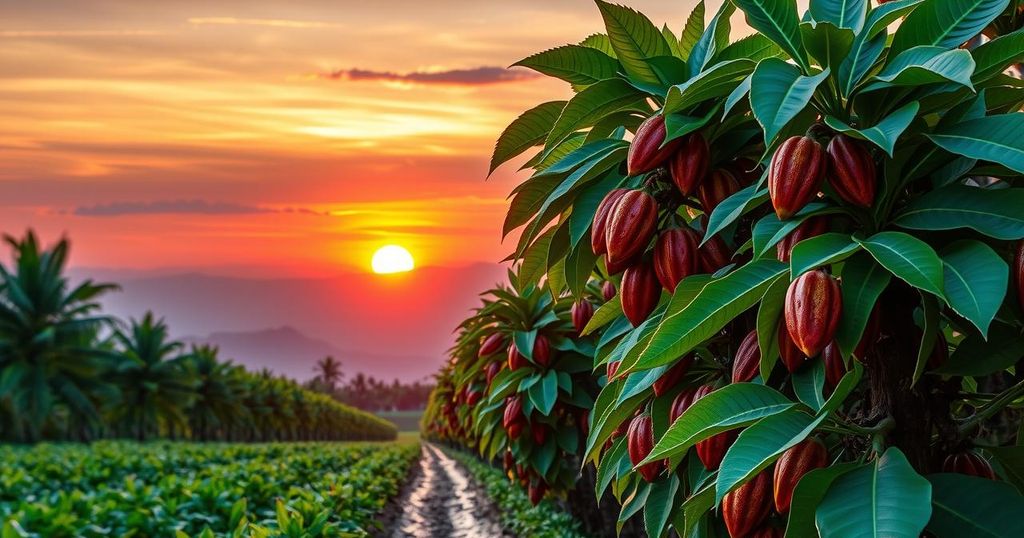The Cocoa Crisis: Climate Change’s Impact on Chocolate Production
A Christian Aid report outlines the impact of climate change on cocoa production, leading to a 400% price increase and threatening the livelihoods of farmers in key regions like Côte d’Ivoire and Ghana. Erratic weather patterns have caused significant crop losses, leading to record-high cocoa prices. The situation necessitates immediate action, including climate finance and sustainable practices, to secure the future of chocolate production.
A recent report by Christian Aid highlights the devastating impact of climate change on cocoa production, particularly in West Africa, where over 50% of global cocoa supply originates. The report reveals that cocoa prices have surged by 400% in recent years, primarily due to extreme temperatures and unpredictable rainfall affecting the crop yields. Farmers in major producing countries such as Côte d’Ivoire and Ghana have experienced significant losses, threatening their livelihoods and the availability of chocolate for consumers.
In 2024, human-induced climate change exacerbated conditions, causing 71% of cacao-producing regions to experience six additional weeks of temperatures surpassing 32°C. The combination of erratic weather, including droughts and excess rainfall, has resulted in crop failures and diseases, leading to soaring global cocoa prices that challenge chocolatiers and producers alike. For instance, cocoa prices reached a record high of $12,605 per ton, reflecting a profound supply shortage.
Small producers and chocolatiers are particularly vulnerable, as rising costs threaten the sustainability of their businesses. Andy Soden of Kernow Chocolate expressed the untenable position many businesses find themselves in, noting the increased wholesale prices are nearing retail levels from just two years prior. The situation highlights the urgent need for effective solutions to mitigate the climate crisis impacting cocoa cultivation.
Christian Aid’s Director Osai Ojigho calls for immediate action to reduce greenhouse gas emissions and implement targeted climate financing for cocoa growers. She emphasizes the criticality of cocoa farming for impoverished communities and urges that the global response to climate change must also consider the needs of farmers who are suffering the consequences.
Additionally, testimonies from cocoa growers like Amelia in Guatemala indicate the profound effects of climate change on their crops and personal lives, as inadequate water supplies lead to food insecurity and declining harvests. Other farmers have echoed similar sentiments, stressing that climate change has invoked overwhelming challenges in sustaining their livelihoods through cocoa production.
Gemma Whitaker from Whitakers Chocolates affirmed their commitment to sustainable practices, advocating for Fairtrade cocoa to ensure that farmers receive appropriate compensation for their work. The company acknowledges that the continuity of cocoa cultivation is threatened by rising temperatures and unpredictable weather patterns, prompting the need for urgent action against climate change.
In conclusion, the report by Christian Aid reveals the dire implications of climate change on the cocoa industry, affecting both the supply chain and the livelihoods of cocoa farmers worldwide. With skyrocketing cocoa prices and crop failures, the need for global action to mitigate climate impacts is more critical than ever. Sustainable practices and fair compensation for farmers are essential to ensure the future of cocoa production and chocolate consumption. Stakeholders must collaborate to create resilient systems to support these vulnerable communities.
Original Source: reliefweb.int




Post Comment